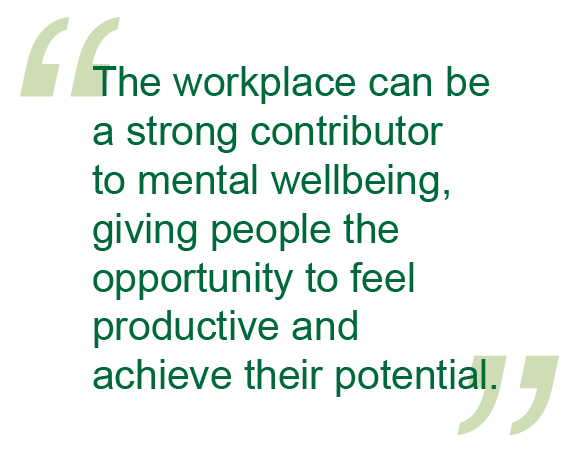Support while working
The workplace can contribute to positive mental health. Work provides income, daily structure and routine, a sense of identity, purpose and accomplishment. In fact, the Mental Health Commission of Canada says that “The workplace can be a strong contributor to mental wellbeing, giving people the opportunity to feel productive and achieve their potential.”
 However, if you have a mental health condition, or suspect you might, you may find it difficult to perform certain job tasks and symptoms may make things more challenging. Suffering silently and pushing through may be your style but this approach can create new difficulties. If symptoms are affecting you at work, you may find yourself making errors, avoiding key activities, alienating others or working long hours to make up for a decrease in your usual work efficiency.
However, if you have a mental health condition, or suspect you might, you may find it difficult to perform certain job tasks and symptoms may make things more challenging. Suffering silently and pushing through may be your style but this approach can create new difficulties. If symptoms are affecting you at work, you may find yourself making errors, avoiding key activities, alienating others or working long hours to make up for a decrease in your usual work efficiency.
There are supports available that may help you remain healthy and productive at work.
- Mental Health Commission of Canada (www.mhcc.ca, retrieved 2014)
Consider your health
- If you are struggling, be sure to have a full medical check-up to find out what may be causing these changes and if any treatment is required.
- Take part in employee wellness initiatives if they are available to you. Some companies provide access to such resources as in-house exercise facilities, meditation or stress management classes.
- If available, access your company’s Employee and Family Assistance Program (EFAP) for confidential brief and solution focused therapies that may help to target the issues you are facing, on and/or off the job.
- Reach out to community services which provide support specific to your situation.
- Try self-help strategies. You may wish to try this free resource called Antidepressant Skills at Work: Dealing with Mood Problems in the Workplace. It has been specifically designed by the Centre for Applied Research in Mental Health and Addiction and BC Mental Health and Addiction Services to help you address depressive symptoms at work.
Consider your needs
Sometimes challenges occur when we are not properly equipped to perform the job, and changes to process or duties may become more difficult if you are dealing with an underlying health condition.
Take stock. Do you have everything you need to understand and perform your job?
- Do you have the necessary tools?
- Do you have the appropriate training?
- Do you understand the expectations of your job role?
- Do you have the right amount of time to complete tasks?
Talk to your supervisor or manager.
- Ask questions
- Explain your concerns
- Ask for help
Although not all jobs or job tasks can easily be adjusted, keeping silent will interfere with finding possible solutions.
Employee and Family Assistance Program (EFAP)
EFAP (or sometimes called EAP – Employee Assistance Program) is a service or suite of services offered to employees by their employer, and often is a part of a group benefits plan.
It is designed to assist employees and their immediate family to cope with or address issues related to stressors of daily living. Most EFAP offer short term solution based counselling, which can be used in-person, on the phone or over the internet.
In addition to providing support for addictions and psychological disorders, most EFAP can address issues related to:
- Marital/family relationships
- Stress and burnout
- Interpersonal relations
- Anger management
- Financial challenges and debt management
- Conflict resolution
- Career transition
- Pre-retirement planning
- Bereavement
- Childcare and/or eldercare
- Nutrition
- Improvements to physical health
Online resources may also be available offering self-help courses, videos, and other health related educational resources.
How does the counselling work?
Most EFAP offer in person and/or telephone counselling provided by clinicians with a psychology or master’s of social work degree. Appointments can be made via the EFAP website or by calling a toll-free confidential number. Your counsellor will set an appointment time that works with your schedule. Sessions are usually one hour in length and may continue for six to eight sessions depending on progress. If your counsellor identifies that longer term support is required, they can assist you with accessing additional resources and expertise.
EFAP counselling services are completely confidential. Your employer is only provided with aggregate utilization based information.
Contact your human resources benefits consultant, manager, or union representative to find out if your benefit plan offers EFAP services.
Do you need to request workplace accommodations?
Sometimes all the right tools, training, supports and communication are in place, however the symptoms of an illness interfere with the ability to perform your job fully or safely. In these cases, you can request a medical accommodation from your employer.
This request will require you to share information with your employer about specific restrictions or limitations that interfere with your performance of the job in the way it has usually been done. You will need to collaborate with your employer to develop and revise the accommodation plan to ensure it meets your unique needs. Accommodation is a formal process and your employer may have clear policies and procedures to ensure this process is handled fairly.
Remember that even with appropriate accommodations in place temporarily or permanently, you may find that ongoing recovery with a mental health condition while working presents challenges. You may experience roadblocks and bumps along the journey. You may need to repeat the steps of considering your health and your needs, and you may need to adjust accommodations.
Should you disclose your condition?
This decision is yours. Self-disclosure of any kind should always have a purpose. Although telling your employer about your condition could elicit support and may be a step in accessing your right to any accommodations you might need to help you perform your job, you may be concerned about discrimination. It may help to know that Statistics Canada found that while workers with disabilities felt their employer would deny training or promotion, the percentage that stated they had experienced this type of discrimination was less than seven per cent.
The Boston University Center for Psychiatric Rehabilitation suggests that disclosure is a complex decision and should be made with care. Here are some things to consider:
Your employer
- Does your employer maintain employee-centred values?
- Does your employer have an accommodation policy? Are there others who have been accommodated?
- Does your employer acknowledge and offer mental health supports such as EFAP or stress management programs?
- To whom should you disclose?
- Human Resources and Occupational Health professionals understand Human Rights, privacy and confidentiality legislation, and may (if available in your workplace) be able to provide you with additional support.
- What is your relationship with your direct supervisor/manager? Sometimes it is easier to talk to someone you know, respect and trust.
Yourself
- What is the cost to you of staying silent?
- What benefits might you gain by disclosing your condition?
- What is the purpose and goal of disclosure at this time?
- What support do you need?
- What will you say? You may find it helpful to practice with a friend, family member or therapist ahead of time, or even prepare a script.
- What will you not say? Even when you disclose a medical condition, you do not need to share all the details.
- With whom are you comfortable with this information being shared? It is ok to discuss the limits on sharing of this information.
Timing:
- Ideally, you would disclose before serious workplace issues arise as a result of the condition so that suitable accommodations can be arranged.
- Perspectives on Labour and Income , Volume 7 no. 2, February 2006: Disability in the workplace http://www.statcan.gc.ca/pub/75-001-x/10206/9096-eng.htm
- Boston University Center for Psychiatric Rehabilitation: Disclosing Your Disability to an Employer http://cpr.bu.edu/resources/reasonable-accommodations/jobschool/disclosing-your-disability-to-an-employer
How can you stay engaged at work?
Envision your own future health and wellbeing in the workplace.
- Identify how you see yourself getting better - what would that mean for you?
- List the steps that you need to take to facilitate that process
- Identify the resources that will help you to regain a sense of wellbeing
- Think about what would be the positive rewards for you if your health improved
Due to ongoing changes in almost all organizations, it is difficult to predict the type of environment you will encounter, and it is therefore important that you are prepared to modify your plans or goals as needed.





